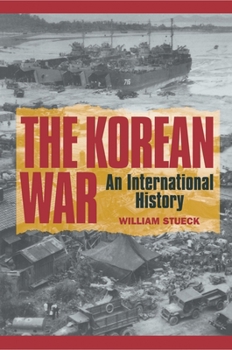The Korean War: An International History
(Part of the Princeton Studies in International History and Politics Series)
Select Format
Select Condition 
Book Overview
This first truly international history of the Korean War argues that by its timing, its course, and its outcome it functioned as a substitute for World War III. Stueck draws on recently available materials from seven countries, plus the archives of the United Nations, presenting a detailed narrative of the diplomacy of the conflict and a broad assessment of its critical role in the Cold War. He emphasizes the contribution of the United Nations, which at several key points in the conflict provided an important institutional framework within which less powerful nations were able to restrain the aggressive tendencies of the United States.
In Stueck's view, contributors to the U.N. cause in Korea provided support not out of any abstract commitment to a universal system of collective security but because they saw an opportunity to influence U.S. policy. Chinese intervention in Korea in the fall of 1950 brought with it the threat of world war, but at that time and in other instances prior to the armistice in July 1953, America's NATO allies and Third World neutrals succeeded in curbing American adventurism. While conceding the tragic and brutal nature of the war, Stueck suggests that it helped to prevent the occurrence of an even more destructive conflict in Europe.Format:Paperback
Language:English
ISBN:0691016240
ISBN13:9780691016245
Release Date:July 1997
Publisher:Princeton University Press
Length:496 Pages
Weight:1.61 lbs.
Dimensions:1.2" x 6.2" x 9.2"
Customer Reviews
1 rating
Was the Korean War a Proxy for WWIII??
Published by Thriftbooks.com User , 22 years ago
Good book! The introduction sets the tone and the theme for the book: thus, it hangs together despite being one of those books which covers the battles of the war in numbing detail. His theses are several: (1)The Korean War substituted for WW III between the two superpowers. (2)The U.N. was not exclusively a U.S. tool. (3)Stalin's motive was to hurt US/China relations, the US, to stop communism; neither cared about Korea. (4)The war had a global impact on defense expenditures, treaties and economic alliances between the various blocs. There is much speculation about times when the war could have come ended sooner. What would the political impact have been? Stueck suggests that great men--Stalin, Mao, Truman/Acheson--not just great ideology, played a role in this critical history. Occupation of Korea by Russian and US forces at the end of WWII was without any specifics..that hurt as relations between the two nations hardened. Both occupying forces were heavyhanded. Russians used reform to calm things down, but the south was in chaos among its political factions. The US, wishing to wash its hands of Korea, turned to the UN as a way to have peninsular elections; the north refused to take part. Some improvement took place in the south in 1950, helped by ruthless suppression of insurrections by Syghman Rhee in the central mountains of Korea. To Stalin, an asian war would detract from the European theatre, and hurt China. Still the USA, China and Russia had profound reasons NOT to clash head on those summer days of 1950. Early diplomatic moves made it clear that the 3 superpowers would confine the battlefield to Korea. Discussion about Allied forces going over the 38th parallel were underway in the US as early as the 10th of August. A status quo ante bellum in September might have been doable. But Stueck never addresses the American argument that we could be 'bled dry' by always merely pushing back Bloc armies: communist insurgencies all over the globe gave the Russians far more flexibility. The In'chon landing changed the momentum of the war; now it was the Russians who tried to slow down Allied progress and momentum for Japanese peace treaties and European rearamament. Military events occurred so quickly those first few months in Korea that they overwhelmed diplomatic processes. Stalin was now in Truman's position three months earlier...his ally trashed, his influence on the line. Given US and Chinese reservations about the course of events, it is a pity they did not talk directly to one another; they might have reached some sort of armistice. Still...how to 'reunite' North with South Korea would remain problematic. Stueck spends vast amounts of time trying to divine the intentions of the combatants. This is not easy: the NKPA were arrogant in July; Americans felt invincible in October; Chinese stubbornness peaked in early 1951. The gloom that swirled in US and European capitals in early December 1950 is far better described by other authors. Ear






